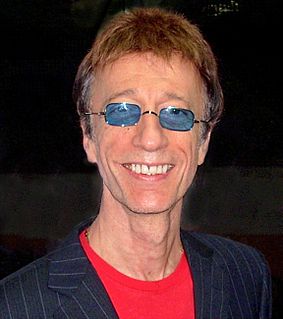
Robin Hugh Gibb was a British singer, songwriter and record producer, who gained worldwide fame as a member of the Bee Gees pop group with older brother Barry and fraternal twin brother Maurice. Robin Gibb also had his own successful solo career. Their youngest brother Andy was also a singer.

Maurice Ernest Gibb was a British musician, singer, songwriter and record producer who achieved fame as a member of the Bee Gees. Although his elder brother Barry Gibb and fraternal twin brother Robin Gibb were the group's main lead singers, most of their albums included at least one or two songs featuring Maurice's lead vocals, including "Lay It on Me", "Country Woman" and "On Time". The Bee Gees were one of the most successful pop-rock groups of all time.

Cucumber Castle is the seventh studio album by the Bee Gees, released in April 1970. It was produced by Barry Gibb, Maurice Gibb, and Robert Stigwood. It consists of songs from their television special of the same name, which was named after a song on their 1967 album Bee Gees' 1st. Cucumber Castle is the only Bee Gees album not to feature any recorded contributions from Robin Gibb, as he had left the group before the album was recorded.

Best of Bee Gees is a 1969 compilation album by the English-Australian rock band Bee Gees. It was their first international greatest hits album. It featured their singles from 1966-1969 with the exception of the band's 1968 single "Jumbo".
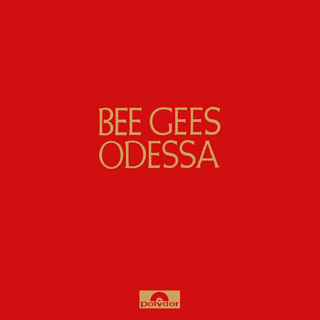
Odessa is the sixth studio album by the Bee Gees, a double vinyl LP released on 30 March 1969, initially in an opulent red flocked cover with gold lettering. Despite reaching the UK Top Ten and the US Top 20, the album was not particularly well-received, though now is regarded by many as the most significant of the group's Sixties albums. An ambitious project, originally intended as a concept album on the loss of a fictional ship in 1899, it created tension and disagreements in the band regarding the work's direction; finally, a dispute over which song to release as a single led to Robin Gibb temporarily leaving the group.
Vincent Melouney (Maloney) is an Australian guitarist, vocalist, and songwriter best known as an official member of The Bee Gees from 1967 to 1969 during the group’s initial period of worldwide success.
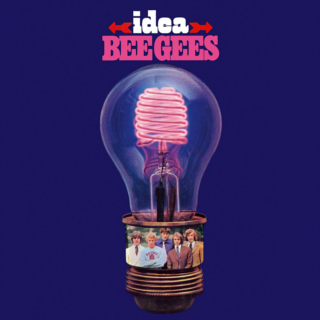
Idea is the fifth album by the Bee Gees. Released in September 1968, the album sold over a million copies worldwide. The album was issued in both mono and stereo pressings in the UK. The artwork on the Polydor release designed by Wolfgang Heilemann featured a "beehive" neon lightbulb with a group photo in its base, while the North American ATCO release designed by Klaus Voormann featured a composite head made from each band member. It was their third internationally released album - the first two albums being released only in the Australian market.
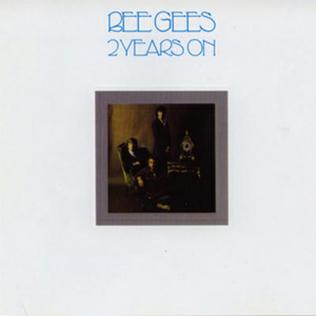
2 Years On is the eighth studio album by the Bee Gees, which reached No. 32 on the US charts. Released in 1970, the album saw the return of Robin Gibb to the group after an earlier disagreement and subsequent split following Odessa. 2 Years On was the first album with drummer Geoff Bridgford, who remained a full-time member of the group until 1972 although he was not pictured on the sleeve. The best-known track is "Lonely Days". Released as the first single by the reunited brothers, it charted high in the US, but peaked at No. 33 in the United Kingdom.
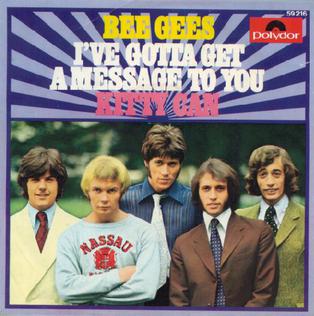
"I've Gotta Get a Message to You" is a song by the Bee Gees. Released as a single on 1968, it was their second number-one single on the UK Singles Chart, and their first US Top 10 hit. Barry Gibb re-recorded the song with Keith Urban for his 2021 album Greenfields.

"I.O.I.O." is a song by the Bee Gees, released on the album Cucumber Castle. It was written by Barry and Maurice Gibb. The song was released as a single in March 1970, and was also one of the highlights of the album. The single was a relative success mainly on European charts. Its music video is taken from the film Cucumber Castle.
"Melody Fair" is a song by the Bee Gees, written by Barry, Robin & Maurice Gibb in 1968 and released in 1969 on their album Odessa. It was not released as a single, but this song was played on many radio stations, and was a hit in Japan. Andy Gibb's 1974 group, named Melody Fayre was named after this song. It also featured as the theme to Melody, a British film featuring a number of Bee Gees songs in its soundtrack.

"Every Christian Lion Hearted Man Will Show You" is a song written by Barry, Robin & Maurice Gibb released by the Bee Gees in 1967 on their album Bee Gees' 1st. It was released as the B-side to "Holiday" in the US, Australia and Canada.
"The Singer Sang His Song" is a song written by Barry, Robin and Maurice Gibb and recorded by the English rock group Bee Gees, released in early 1968 as a single along with Jumbo. In some countries the song was the B-side of Jumbo but in others they were promoted as a double A-side.
"Odessa " is a song by the English rock band the Bee Gees, written by Barry, Robin & Maurice Gibb in 1968 and released in early 1969. The song opened the album of the same name. The song was recorded twice. The first version of the song was later to appear on Sketches for Odessa and has a duration to 6:40. The song was about the survivor of a shipwreck, and was originally intended to form the basis of the whole album. Musically it was dominated by strings and acoustic guitar. It was originally proposed to be the first single of the album.
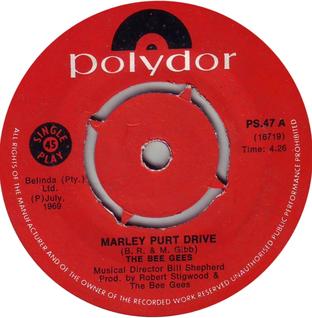
"Marley Purt Drive" is a song recorded by the Bee Gees, It was written by Barry, Robin & Maurice Gibb and released in March 1969 on the album Odessa. It was released in stereo in the United States in January and its mono version was released in the United Kingdom in March. The remastered version of this song was released on 27 February 2009 on Reprise Records.
"Kitty Can" is a song by the Bee Gees, composed by Barry, Robin & Maurice Gibb. It was released as the B-side of "I've Gotta Get a Message to You" in July 1968, and as the second track on the album Idea in September 1968. In 1973, RSO Records released a compilation called Kitty Can only in Argentina and Uruguay, and this song appeared as the first track on that album.
"Black Diamond" is a song by the Bee Gees released on the album Odessa in 1969. The song was written by Barry, Robin & Maurice Gibb and featured lead vocals by Robin Gibb. It was included on the compilation Marley Purt Drive released in 1970.
"Sound of Love" is a ballad number performed by the Bee Gees, It was written by Barry, Robin & Maurice Gibb, and appeared on their album Odessa in 1969.
"Never Say Never Again" is a song by the Bee Gees, It was written by Barry, Robin & Maurice Gibb in 1968 and released on the album Odessa in 1969.

"Lamplight" is a song by the Bee Gees, released as the B-side of "First of May", but featured as the single's A-side in Germany. It also featured on their double album Odessa in March 1969. The song was written and composed by Barry, Robin & Maurice Gibb and featured lead vocals by Robin Gibb. No other singles were released from the album, and the fact that the group's manager Robert Stigwood chose "First of May", which only featured Barry Gibb's voice for the A-side, that caused Robin to quit the group.











